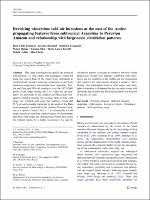Revisiting wintertime cold air intrusions at the east of the Andes: propagating features from subtropical Argentina to Peruvian Amazon and relationship with large-scale circulation patterns
Metadata
Show full item recordAbstract
This study investigates the spatial and temporal characteristics of cold surges that propagates northward along the eastern flank of the Andes from subtropical to tropical South America analysing wintertime in situ daily minimum temperature observations from Argentina, Bolivia and Peru and ERA-40 reanalysis over the 1975–2001 period. Cold surges usually last 2 or 3 days but are generally less persistent in the southern La Plata basin compared to tropical regions. On average, three to four cold surges are reported each year. Our analysis reveals that 52 % of cold episodes registered in the south of La Plata basin propagate northward to the northern Peruvian Amazon at a speed of around 20 m s−1. In comparison to cold surges that do not reach the tropical region, we demonstrate that these cold surges are characterized, before they reach the tropical region, by a higher occurrence of a specific circulation pattern associated to southern low-level winds progression toward low latitudes combined with subsidence and dry condition in the middle and low troposphere that reinforce the cold episode through a radiative effect. Finally, the relationship between cold surges and atmosphere dynamics is illustrated for the two most severe cold intrusions that reached the Peruvian and Bolivian Amazon in the last 20 years.
The following license files are associated with this item:








